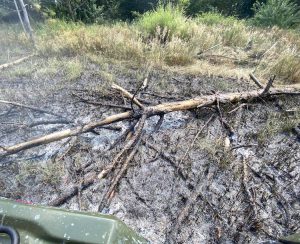By Anthony Bolesta, EMANR alum
Approximately one week after graduating from the University of Florida with a bachelor’s degree in Interdisciplinary Studies: Environmental Management in Agriculture and Natural Resources (EMANR), I was offered a great opportunity to work for the Florida Department of Environmental Protection (DEP). The job focuses on Mining and Mitigation strategies and includes a wide variety of land management strategies.
To start, I would like to point out that this field office in Bartow, Fla., was filled with employees who were very open to educating and training newly hired staff such as myself. I was never given a task without the reassurance that I would know how to do it correctly. My daily job functions comprised mostly of habitat rehabilitation, plant identification (primarily invasive species, such as Cogon grass and Brazilian pepper), tree felling, herbicide application, greenhouse management, irrigation maintenance and installation, and more.
In the Field

(Photo provided)
The property I primarily work at is a reclaimed phosphorous mine in Bartow, approximately 800 acres in size. There currently is a cattle lease attached to a portion of the property, so that section sees relatively no management on our part. Most of the property, however, has us planting trees such as longleaf and slash pines. As for invasive trees, Brazilian pepper and Chinaberry trees are often killed with precision herbicide application. Personally, I prefer to use a chainsaw to fell the trees and implement a small amount of Basil Bark herbicide around the perimeter of the stump to have fewer chemicals used throughout the management.
This work often occurs in uneven terrain that has snakes possibly living within the vegetation. So, in addition to a chainsaw, the equipment I often use is a UTV for transportation, snake-proof or chainsaw chaps, herbicide spray, a machete, hard hat, safety glasses, and gloves. For grasses and other smaller invasives, I will often drive out on an ATV and use a boom sprayer on the back of the ATV if there is a larger monoculture patch of land. For smaller areas of treatment, a “wand” sprayer is used instead. This is easy to swap out as it is controlled by a lever that regulates the flow from boom to wand.
In the Office
At this field office, there are three senior employees who specialize in land management, environmental engineering, and wildlife science. My OPS position allows me to work on a wide range of subjects and projects with them in a supporting role. This could include simple matters like planting pet projects for ecological purposes, assisting a cooperative effort with Bok Tower Botanical Garden researchers, creating deer-proof cages to protect recently planted species and installation and repair of irrigation pipelines.
Additionally, these senior employees say an OPS can assist them and shadow their work in the regulatory portion of this field of science, such as wetland delineation or other regulatory functions performed by the DEP. This fosters a great combination of learning and resumé building, especially as I pursue my master’s degree. Overall, the job is fantastic and the only downside I have encountered in the four months I have been employed here is the heat of Florida summer days.
Future Work
As I complete this blog post on my OPS position, I have been extended an offer to take a full-time position with the DEP in Temple Terrace, northeast of Tampa. I will be taking on a regulatory role that will interact with the public and assist with regulation and compliance. I hope to provide an update on this position in the future.
Learning Experience
As far as the classes that carry over the most into environmental work at the state level, I would say that soil and water courses dealing with land management, like Ag & Environmental Quality and Soil Water Conservation, are most applicable. As for the regulatory side, I believe Environmental Soil Water Monitoring Technology will be the most useful as it was the most involved with testing, analyte groups, legal limits of contaminants, etc.
 0
0
